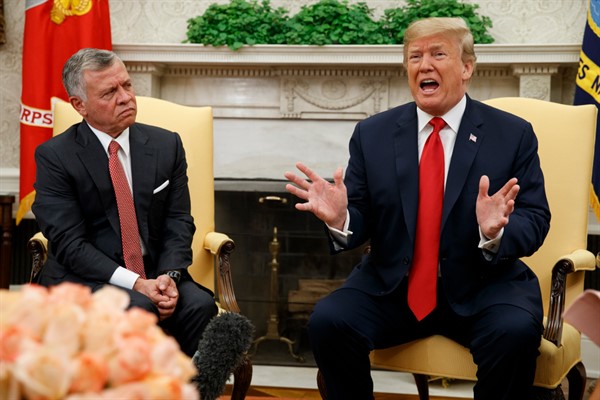The usually warm relationship between the United States and Jordan has come under strain during President Donald Trump’s time in office. Jordanian leaders have criticized many of Trump’s policies in the region, especially his support for Israeli settlements in the West Bank, his decision to recognize Jerusalem as the capital of Israel and his one-sided proposal for a peace deal between Israel and the Palestinians.
It was no surprise, then, that Jordan’s King Abdullah II was one of the first world leaders to congratulate Joe Biden for his victory over Trump in last month’s presidential election. And in a phone conversation with Abdullah last week, his first with an Arab leader, Biden told the king that he hopes to cooperate on pursuing “a two-state solution to the Israeli-Palestinian conflict.” It remains unclear, though, just how much of a priority that will be for Biden as he enters office with a herculean to-do list.
This week on Trend Lines, WPR’s Elliot Waldman was joined by Marwan Muasher, a former foreign minister and deputy prime minister of Jordan who’s now vice president for studies at the Carnegie Endowment for International Peace. They discussed the implications of Biden’s presidency for Jordan, for the Israelis and Palestinians, and for U.S. policy toward the Middle East writ large. Click here to read a transcript of an excerpt from the interview.
Listen:
Download: MP3
Relevant Articles on WPR:
Israel-Gulf Normalization Sends Palestinians Back to the Drawing Board
Is Jordan on the Verge of an Economic Reckoning?
‘The Path of Negotiations Has Failed.’ Where Annexation Leaves Palestinians
Trump’s ‘Deal of the Century’ Will Doom Peace Between Israelis and Palestinians
Trend Lines is edited by Peter Dörrie, a freelance journalist and analyst focusing on security and resource politics in Africa. You can follow him on Twitter at @peterdoerrie.
To send feedback or questions, email us at podcast@worldpoliticsreview.com.




